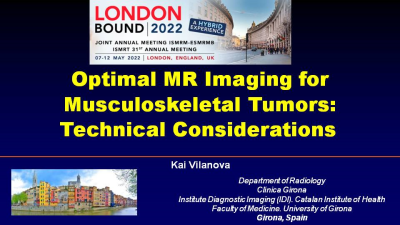Sunrise Course
Musculoskeletal Imaging: Optimal MR Imaging for Musculoskeletal Tumors
Joint Annual Meeting ISMRM-ESMRMB & ISMRT 31st Annual Meeting • 07-12 May 2022 • London, UK

| 08:00 |  |
Optimal MR Imaging for Musculoskeletal Tumors: Technical Considerations
Kai Vilanova
A comprehensive tumor imaging protocol should provide the optimal anatomic and functional information within the different sequences. It requires to include conventional pulse sequences (T1-weighted and fluid-sensitive sequences: fat-suppressed T2 weighted or STIR) with functional ones such as chemical shift MR imaging (in-phase and opposed-phase imaging/Dixon), diffusion-weighted imaging, perfusion (time resolved MRI) and/or spectroscopy. Each sequence should be performed properly to provide the different and additional information for the assessment of a musculoskeletal lesion: detection-diagnosis, characterization, determination of extent, or the posttreatment setting for recurrence and treatment response.
|
|
| 08:30 | Optimal MR Imaging for Musculoskeletal Tumors: Clinical Considerations
Amanda Isaac
|
The International Society for Magnetic Resonance in Medicine is accredited by the Accreditation Council for Continuing Medical Education to provide continuing medical education for physicians.